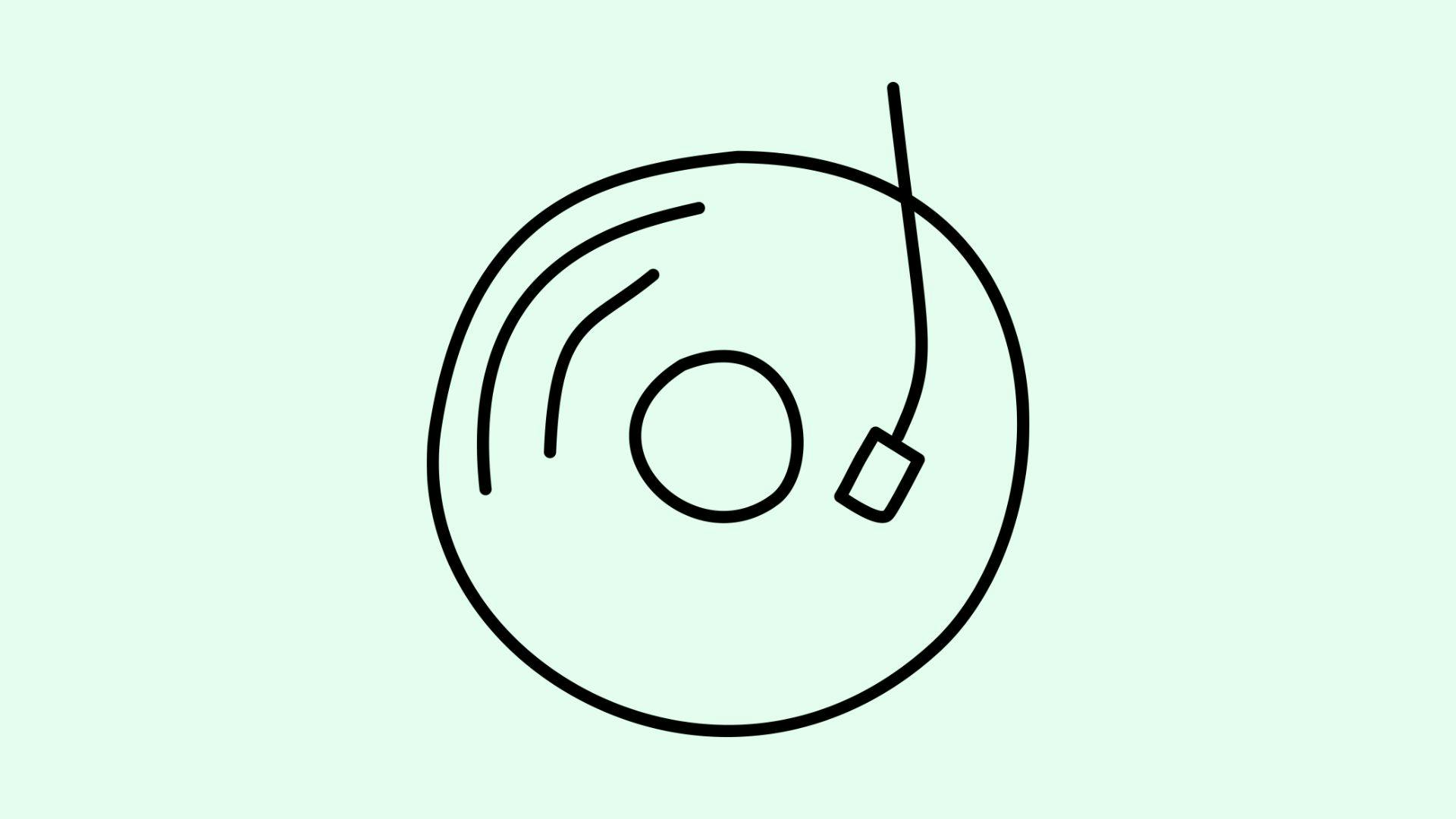You spend hours each week writing clinical documentation instead of focusing on what you do best, helping patients heal. AI medical scribe software is changing how healthcare professionals handle medical documentation by converting therapy sessions into detailed clinical notes automatically.
Today’s AI scribes do more than just listen.
They turn conversations into clinical intelligence, picking up on therapeutic nuances, organizing information into the right note format, and leaving you with documentation that’s almost complete before the session even ends.
What is an AI Medical Scribe Software?
AI medical scribe software uses speech recognition and natural language processing (NLP) to capture patient–clinician conversations and convert them into structured documentation.
How it works:
- Recording: With patient consent, the session is recorded in real time.
- Transcription: Speech recognition converts conversations into text.
- Intelligence Layer: NLP identifies symptoms, interventions, and treatment plans.
- Structured Output: The system organizes everything into SOAP, DAP, or progress notes.
- EHR Integration: Notes sync directly into your existing systems.
Think of it as a digital assistant that listens, understands, and writes your notes while you focus on patient care.
Why Mental Health Professionals Need a Specialized AI Scribe
If you’re in mental health, a generic AI scribe might not cut it.
Therapy sessions are conversation-heavy, emotionally nuanced, and require unique documentation formats. A purpose-built mental health scribe matters because it:
- Understands therapy language: Terms like cognitive distortions, DBT skills, or exposure hierarchies won’t be misinterpreted as casual conversation.
- Supports therapy note formats: SOAP, DAP, and treatment plans are built in, so you’re not editing raw transcripts.
- Integrates with mental health EHRs: Works seamlessly with platforms like SimplePractice or TherapyNotes.
- Prioritizes privacy: Mental health records often carry stricter confidentiality rules- specialised scribes meet those standards.
Without these features, you risk spending extra hours correcting errors or reformatting notes.
Key Benefits for Healthcare Professionals
AI medical scribe technology delivers two primary advantages that directly impact your practice’s efficiency and quality of patient care.
Time Savings and Efficiency
You can reduce documentation time from hours to minutes with AI Scribe software. Instead of spending 2-3 hours after patient visits writing notes, you’ll complete documentation in 10-15 minutes.
This dramatic time reduction frees you to focus on what matters most. Your therapeutic work with patients becomes the priority.
The decreased administrative burden means you can see more patients. You’ll maintain a better work-life balance or dedicate additional time to treatment planning.
Improved Note Quality
AI scribes ensure consistent documentation standards across all your sessions. You’ll eliminate transcription errors that commonly occur when rushing through manual note-taking.
The software captures therapeutic conversations accurately. This ensures better compliance with clinical requirements and insurance standards.
This consistency protects your practice legally. It maintains the detailed documentation necessary for effective treatment continuity.
Top AI medical scribe software
Here are the leading AI medical scribe software options evaluated across healthcare settings.
Instead of a one-size-fits-all list, we’ve grouped the top AI medical scribe platforms by specialty, so you can quickly find the right fit whether you’re a therapist, physician, or run a multi-specialty clinic.
Mental Health-Focused Platforms
1. Supanote
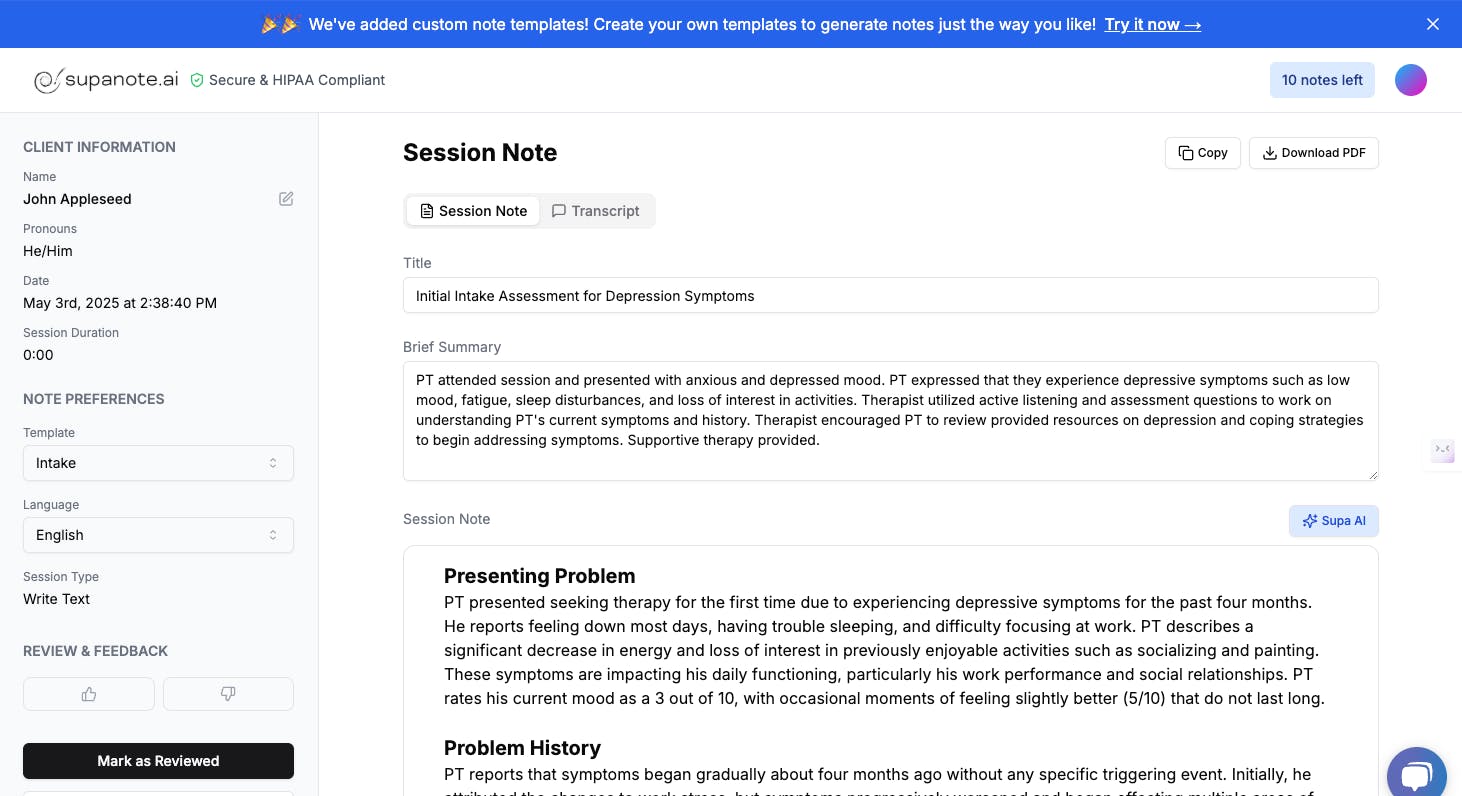
Supanote stands out as one of the few AI medical scribe software platforms built exclusively for mental health professionals. The platform understands therapeutic language and processes better than general medical scribe solutions.
- Native EHR systems integration through their proprietary Super Fill button eliminates copy-paste workflow challenges
- Deep personalization engine learns your clinical documentation style and preferred terminology over time
- Supports all major mental health note formats, including SOAP, DAP, and progress notes for comprehensive clinical notes
- Automated treatment plan suggestions based on patient encounters and session content
Pricing (Annual billing): Starting at $19.99/month for 40 notes, with Professional ($39.99/100 notes) and Premium ($69.99/unlimited) tiers
Best suited for: Individual clinicians in private practice and small clinics seeking purpose-built documentation solutions
2. Heidi Health
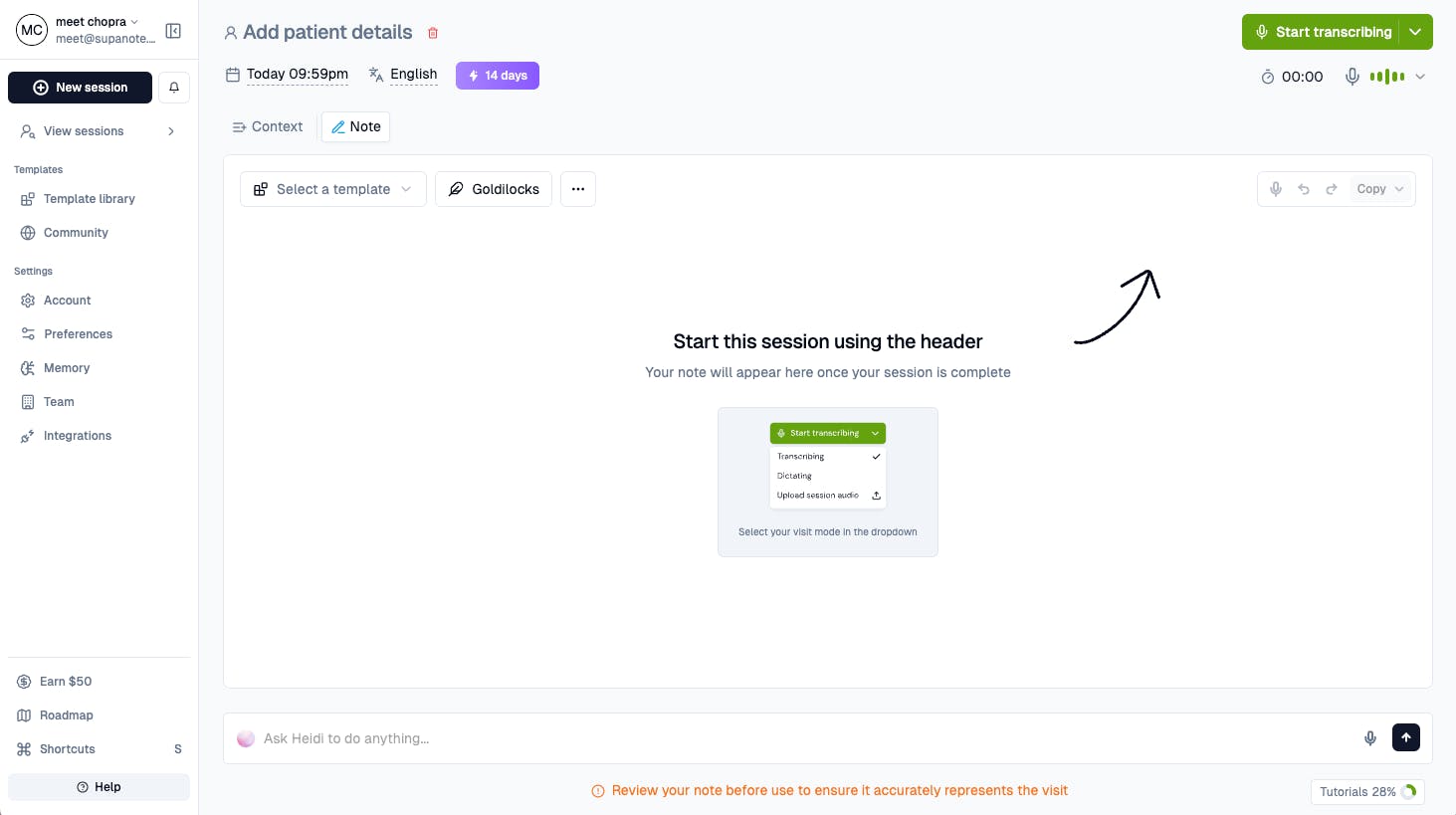
Heidi Health provides a robust free tier that appeals to international healthcare professionals, with extensive multilingual capabilities and flexible Pro Action credits system.
- 10 Pro Actions monthly on the free tier for ongoing testing and light use
- Support for 50+ countries with multilingual clinical documentation capabilities
- General medical focus with growing mental health template library
- Credit-based system allows flexible usage patterns
Pricing: Free plan available; Pro at $799/year per user, Together at $1,199/year per user (both billed annually), with custom pricing for Enterprise plans and a 14-day free trial for paid tiers.
Best suited for: International providers, bilingual therapy practices, and healthcare professionals wanting flexible usage-based pricing.
Physician & Multi-Specialty Platforms
1. Freed.AI
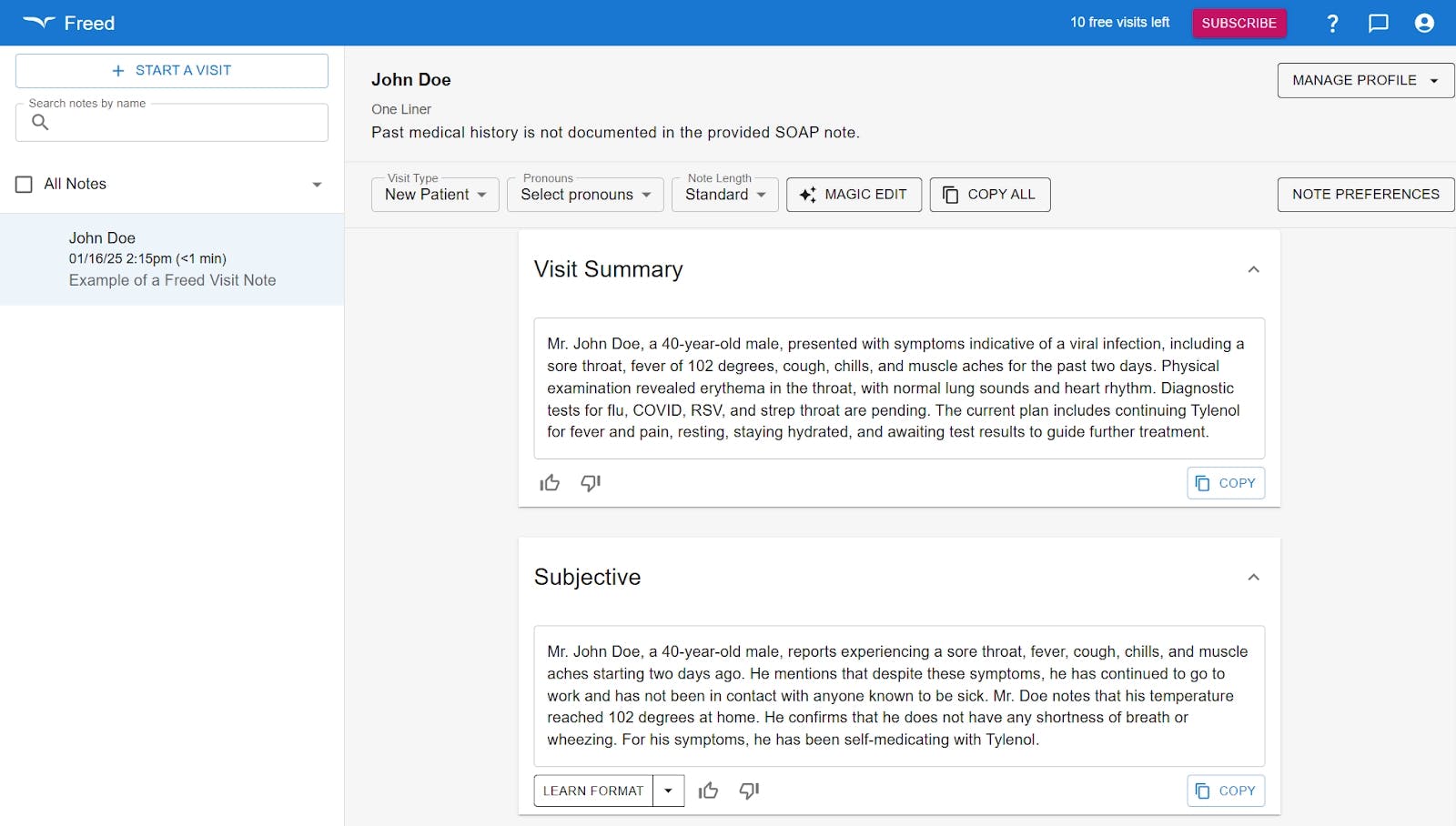
Freed.ai represents a general medical AI scribe solution that has adapted well to mental health use cases. The platform’s strength lies in its unlimited note processing and multi-specialty support for healthcare professionals.
- Unlimited notes at a flat monthly rate regardless of session volume or patient visits
- Strong accuracy across medical specialties including psychiatry and psychology practice areas
- Robust free trial with 10 full visits to test functionality and efficiency
- Multi-language support for diverse patient populations in various healthcare settings
Pricing: Starts at $90/month for solo clinicians, $84/month per clinician for 2–9 users (billed annually), with custom pricing for 10+ users, 7-day free trial also available
Best suited for: High-volume practices, integrated medical-mental health clinics, and healthcare providers seeing 100+ patients monthly
2. Suki AI
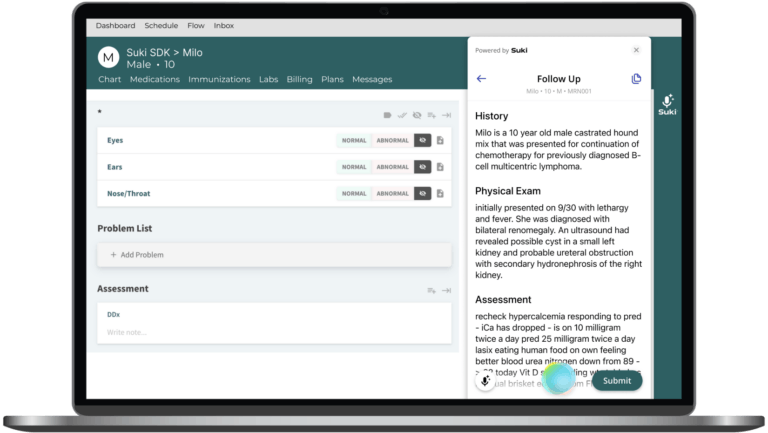
Suki AI is a voice-first medical scribe platform designed for clinicians who prefer documenting through speech. It uses ambient AI technology to capture patient visits, generate structured notes, and streamline coding workflows with seamless EHR connectivity.
- Voice-driven note generation and navigation
- ICD-10 coding support with built-in intelligence
- Deep EHR integration across major systems
Pricing: $299/month per user (Compose) or $399/month per user (Assistant)
Best suited for: Clinicians and practices seeking premium voice-powered documentation with advanced EHR integration
3. DeepScribe
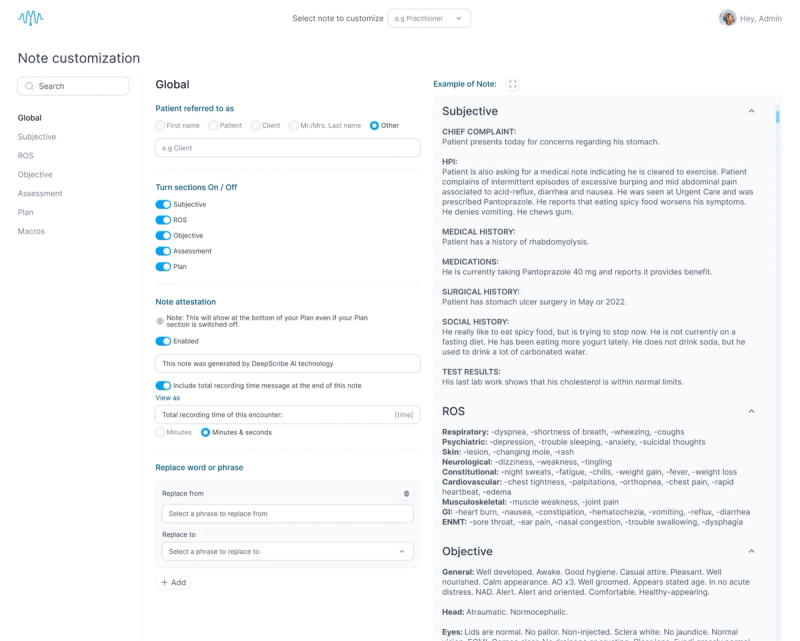
DeepScribe is an ambient AI scribe built to remove the burden of manual note-taking by automatically documenting patient visits. It listens in on natural clinician–patient conversations, filters out small talk, and generates accurate, specialty-specific notes. Designed with healthcare workflows in mind, DeepScribe integrates directly with EHR systems, allowing clinicians to focus more on care and less on paperwork.
- Captures natural clinician–patient conversations
- Specialty-specific documentation formats
- Automatic integration into EHRs
Pricing: Starts at $400/month per provider (non-EHR plan); EHR-integrated plan available at custom pricing with premium features and direct EHR sync.
4. Abridge
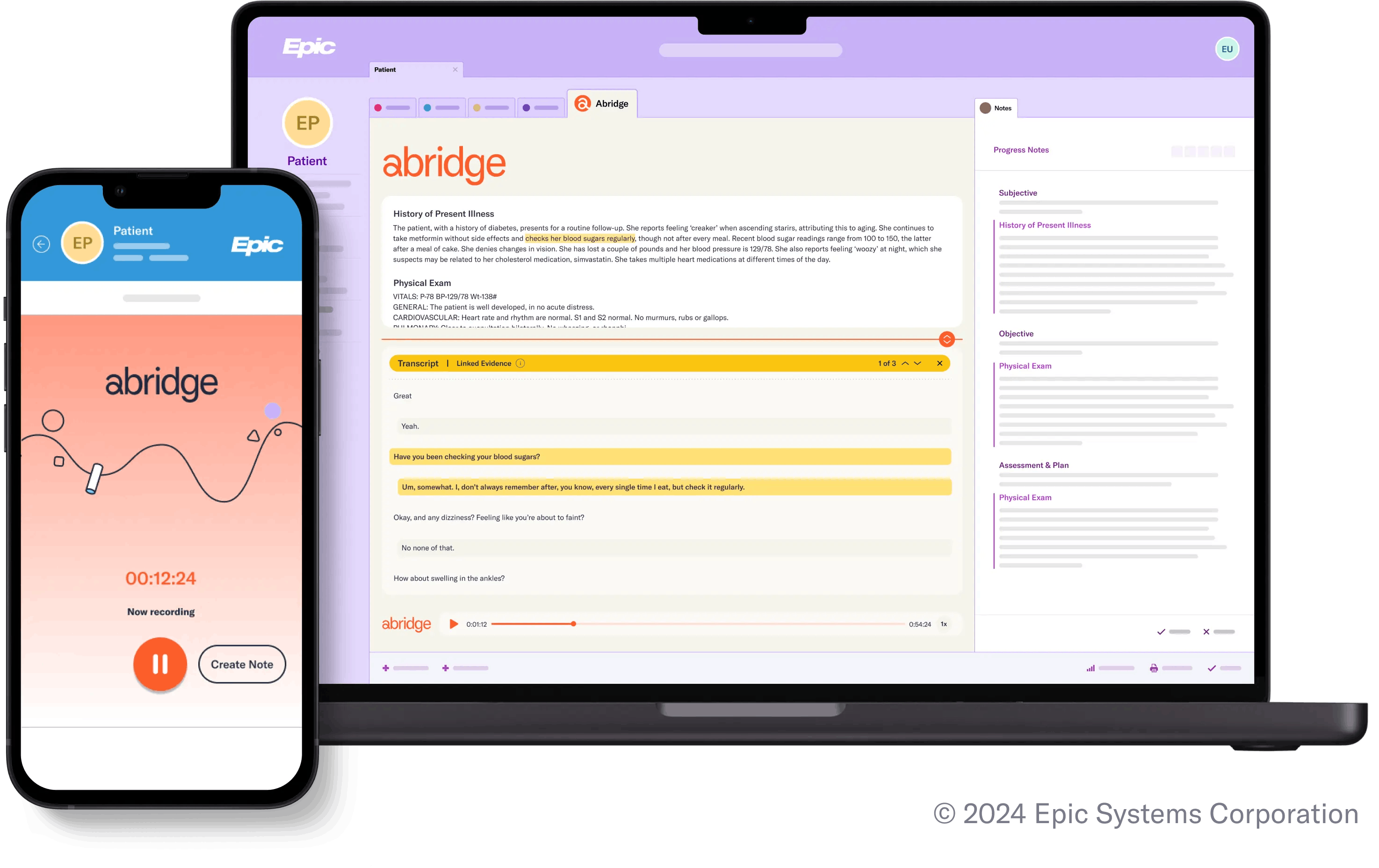
Abridge is an enterprise-grade AI scribe that turns patient–clinician conversations into structured, billable notes in real time. Its advanced contextual reasoning engine makes it especially valuable for compliance and reimbursement workflows.
- Real-time ambient note generation
- Context-aware summaries for billing and compliance
- Broad specialty coverage
Pricing: Estimated pricing for Abridge starts at $250 per month.
Best suited for: Enterprise and health systems needing scalable scribe solutions
5. Sunoh.AI
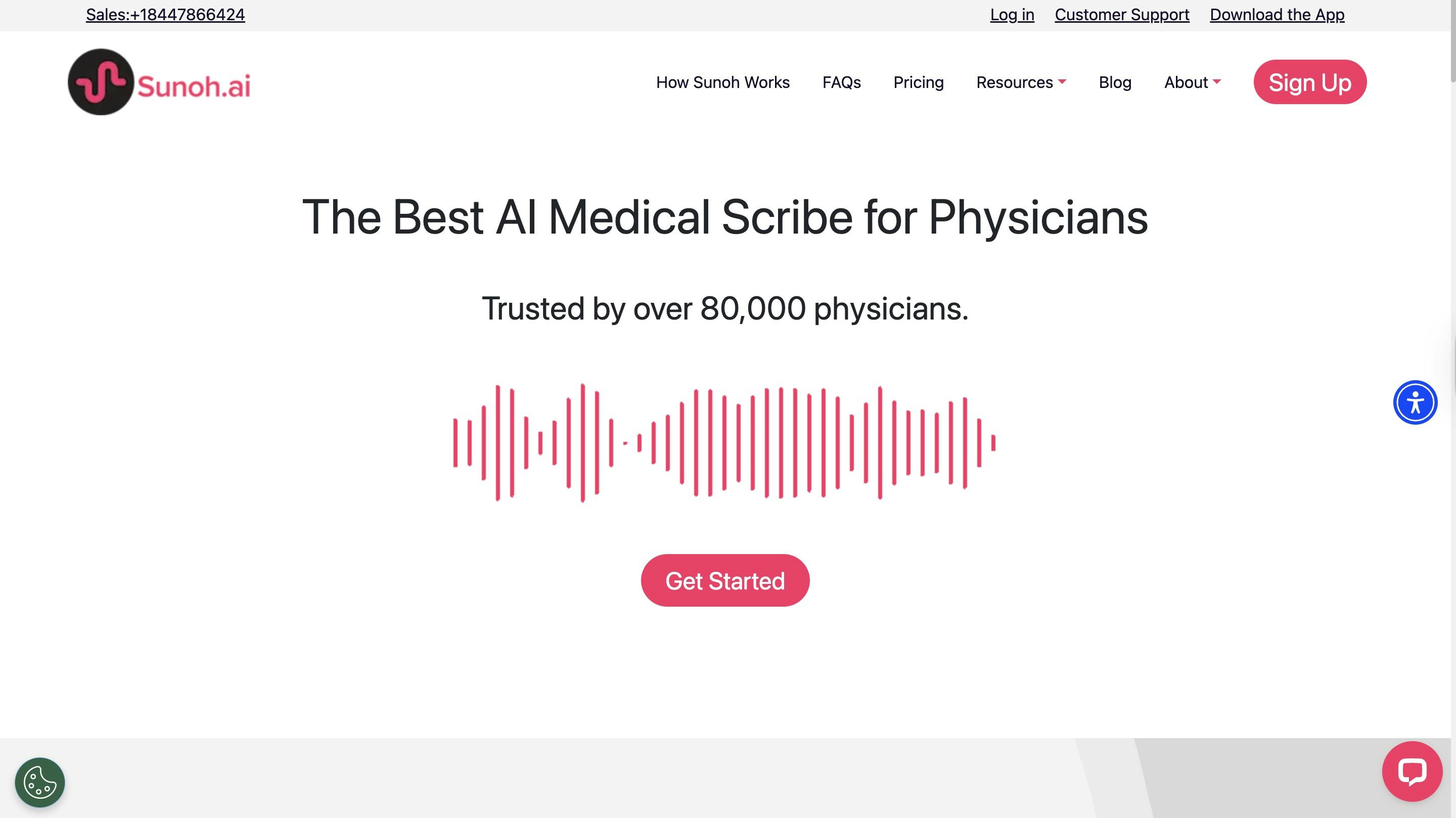
Sunoh.ai is a real-time ambient scribe designed for affordability and ease of use. It captures clinician, patient conversations, generates structured, billable notes, and even supports order entry, all at a flat monthly price.
- Real-time transcription and summarization
- Structured, billable note output
- Integrated order-entry assistance
Pricing: Starting at $149 per user per month
Best suited for: Providers seeking affordable, real-time AI scribing with EHR integration
All these platforms offer various approaches to AI-powered documentation, from recording-free summarization to credit-based flexible usage models.
Each serves distinct practice types and workflow preferences within the mental health community.
6. NoteMD
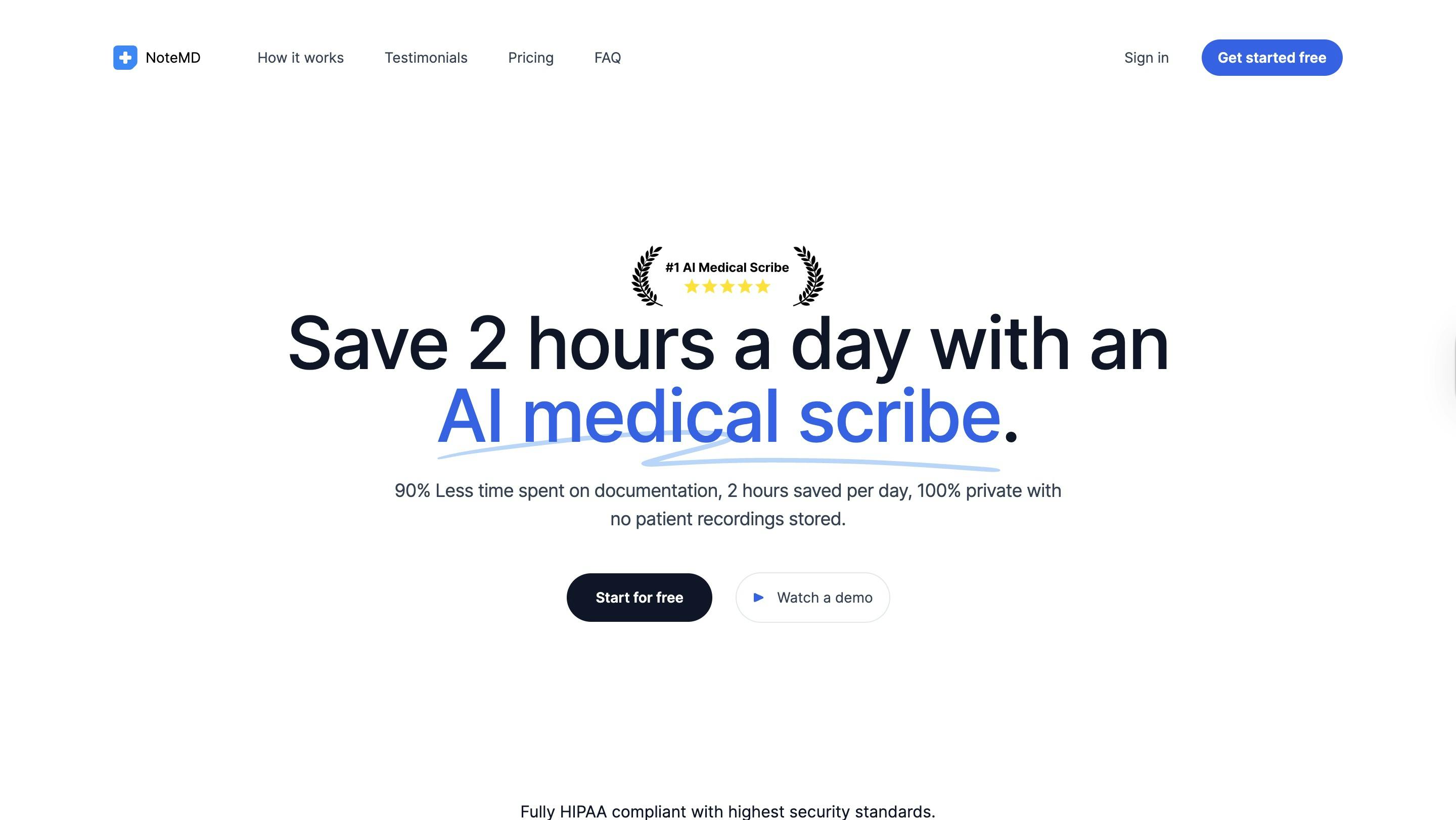
NoteMD offers a straightforward approach to AI scribing by letting clinicians either record live visits or upload transcripts. It then transforms conversations into SOAP notes quickly, making it simple yet powerful for smaller practices.
- Record or upload workflows
- Easy SOAP note generation
- Lightweight, user-friendly platform
Pricing: Free plan includes 10 visits; Pro plan at $99/month offers unlimited visits with annual discounts available; Group plans available on request for larger organizations.
Best suited for: Clinicians wanting simple, affordable AI scribing
AI Medical Scribe Software Comparison
Here’s a comprehensive comparison of the top AI medical scribe tools, focusing on pricing and their suitability across healthcare settings:
Tool | Starting Price | Best Suited For |
|---|---|---|
Supanote.AI | $19.99/month (40 notes) | Individual clinicians and small practices needing therapy-specific documentation |
Freed.AI | $90/month (unlimited) or $84/user (group) | High-volume practices and providers seeing 100+ patients monthly |
Heidi Health | Free (10 Pro Actions); $39/month Basic; $99/month Pro | International providers, bilingual practices, and clinics needing multilingual support |
Suki AI | $299/month (Compose); $399/month (Assistant) | Clinicians seeking premium voice-powered documentation with EHR integration |
DeepScribe | ~$400/month (without EHR); ~$500/month (with EHR) | Clinics and practices needing specialty-tuned, ambient documentation |
Abridge | $250 per month | Enterprise and health systems needing scalable scribe solutions |
NoteMD | Free (10 visits); $99/month Pro unlimited | Clinicians wanting simple, affordable AI scribing |
Sunoh.AI | $149/month per user | Providers seeking affordable, real-time AI scribing with EHR integration |
While general medical scribes offer broad functionality, mental health-specific tools like Supanote provide specialized features that better understand therapeutic language and workflows, making them ideal choices for mental health professionals.
Your choice should be dependent on the kind of practice you run, your documentation volume, and the level of integration you need with your existing EHR system.
What to Consider When Choosing AI Medical Scribe Software
Selecting the right medical scribe solution requires careful evaluation of several key factors that directly impact your practice efficiency and patient care quality.
Specialization vs. Generalization
Mental health-specific tools like Supanote offer significant advantages over general medical scribe platforms. These specialized solutions understand therapeutic language, recognize treatment modalities, and generate structured notes using familiar frameworks like SOAP and DAP.
They’re built to handle the nuanced conversations that occur in therapy sessions, rather than treating mental health as an afterthought.
Integration and Workflow Considerations
Native EHR systems integration streamlines your documentation process far more than copy-paste workflows. Tools offering direct integration eliminate extra steps and reduce transcription errors.
Consider the setup complexity, some platforms require minimal configuration, while others demand extensive training. Evaluate how each option fits your current workflow rather than forcing major practice changes.
Cost and Value Analysis
Pricing models vary significantly across platforms:
- Per-note pricing (Supanote: $19.99/month for 40 notes)
- Unlimited options (Freed.ai: $90/month)
Calculate your ROI based on documentation time savings. If you typically spend 15 minutes per note and see 20 patients weekly, reducing that to 5 minutes saves 3.3 hours weekly.
Most platforms offer free trials; use them to test real-world performance with your actual patient visits before committing.
Frequently Asked Questions
Q. Is AI medical scribe software HIPAA compliant for therapy sessions?
A. Yes, reputable ai scribe platforms are built with HIPAA compliance as a core feature. They use encryption, secure data storage, and signed business associate agreements.
Always verify compliance before selecting any platform for your practice.
Q. Can AI scribes understand therapy-specific language and terminology?
A. Mental health-focused AI scribes like Supanote are specifically trained on therapeutic language and clinical terminology. They understand concepts like transference, cognitive distortions, and treatment modalities.
General medical scribes may struggle with specialized mental health vocabulary.
Q. How accurate are ai medical scribe generated therapy notes compared to manual clinical documentation?
A. AI medical scribe software typically achieves 90-95% accuracy for clinical notes when properly trained on patient interactions. You’ll still need to review and edit clinical documentation for accuracy and completeness. Most healthcare professionals find ai powered first drafts require minimal corrections and save time significantly. The artificial intelligence learns from your documentation patterns to improve accuracy over patient visits.
Q. Do I need special equipment to use medical scribe solutions?
A. Most ai medical scribe platforms work with standard computers, smartphones, or tablets with built-in microphones for real time medical documentation. Some healthcare providers offer dedicated recording devices for better audio quality during patient encounters. You don’t need expensive hardware—just a reliable internet connection and basic recording capability for comprehensive clinical notes generation.
Q. How long does implementation take for healthcare professionals?
A. Most clinicians become proficient with ai scribe technology within 1-2 weeks of regular practice use. Initial setup typically takes 30-60 minutes to configure customizable templates and preferences in ehr systems. The learning curve is minimal—physicians primarily need to remember to start recording patient visits for automatic medical documentation.
Q. Can medical scribe software integrate directly with my existing workflow?
A. Seamless integration varies by ai medical platform and health systems compatibility. Some tools like Supanote offer native integration with popular mental healthcare ehr systems for individual clinicians. Others require copy-and-paste workflows that still reduce administrative burden. Check compatibility with your specific data systems before committing to a solution.
Q. What happens if the ai misses important clinical information during patient care?
A. AI-powered scribes generate draft structured notes that require professional review and editing by healthcare providers. You maintain full control over the final documentation quality and accuracy. Most platforms allow clinicians to add, modify, or correct any patient information before finalizing comprehensive clinical notes in their background systems.
Q. Are there different pricing models for the best AI medical scribe solutions?
A. Yes, pricing varies significantly across AI medical platforms serving healthcare professionals. Some charge per note (starting around $1-3), others offer unlimited monthly plans for small clinics and hospitals. Many provide free tiers with limited features for physicians to test the workflow integration. Calculate costs based on your monthly patient encounters to find the best value solution.
Q. Can I use AI Scribe technology for group therapy or couples sessions?
A. Most medical scribe platforms can handle multiple speakers during patient interactions, though accuracy may decrease with more participants. Some AI medical solutions specifically support group formats with advanced automation. Check with your chosen healthcare provider about multi-participant capabilities and any additional setup requirements for efficient documentation.
Q. Is AI medical scribe software HIPAA compliant for patient care?
A. Reputable AI medical scribe platforms are built with HIPAA compliance as a core feature for healthcare professionals. They use encryption, secure data storage, and signed business associate agreements to protect patient information. Always verify HIPAA-compliant status before selecting any solution for your practice workflow.
Conclusion
AI medical scribes cut documentation time from hours to minutes, freeing clinicians to focus on patient care instead of paperwork.
Mental health providers especially benefit from tools like Supanote, which understand therapeutic language and integrate seamlessly with therapy EHRs.
Start with free trials to find a platform that fits your workflow- the right AI scribe can transform your efficiency, reduce burnout, and improve care delivery almost overnight.
